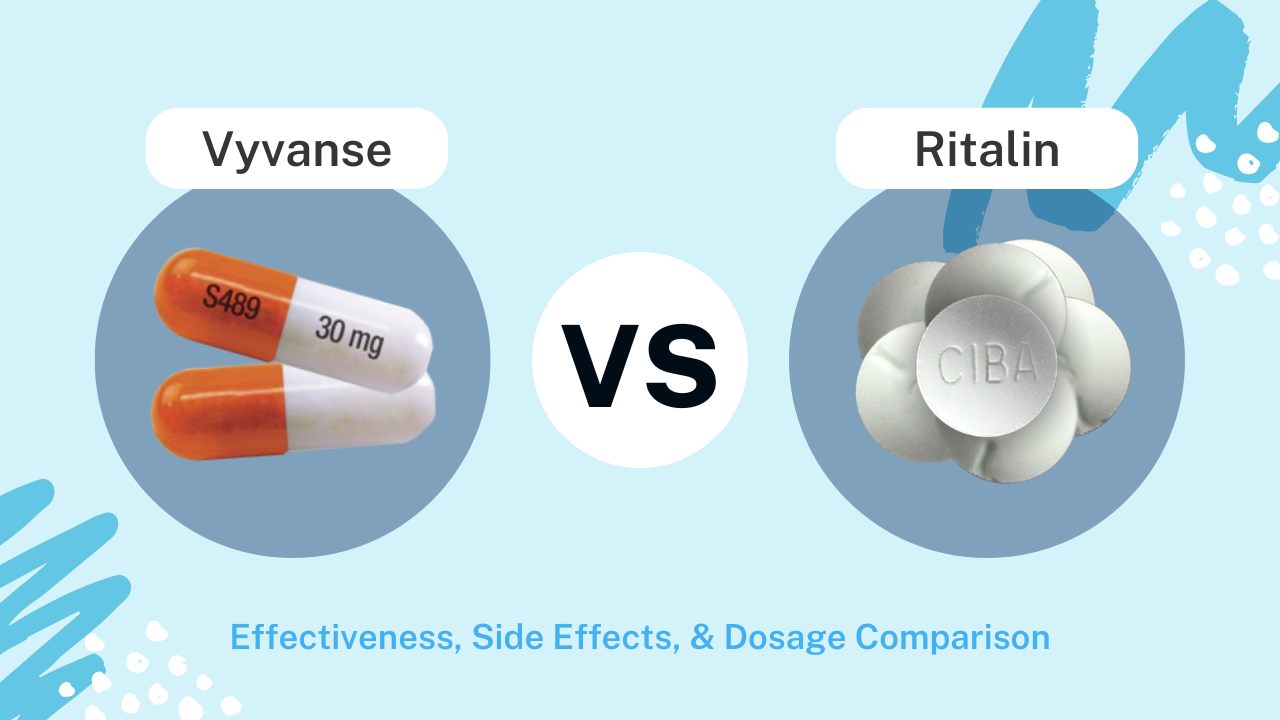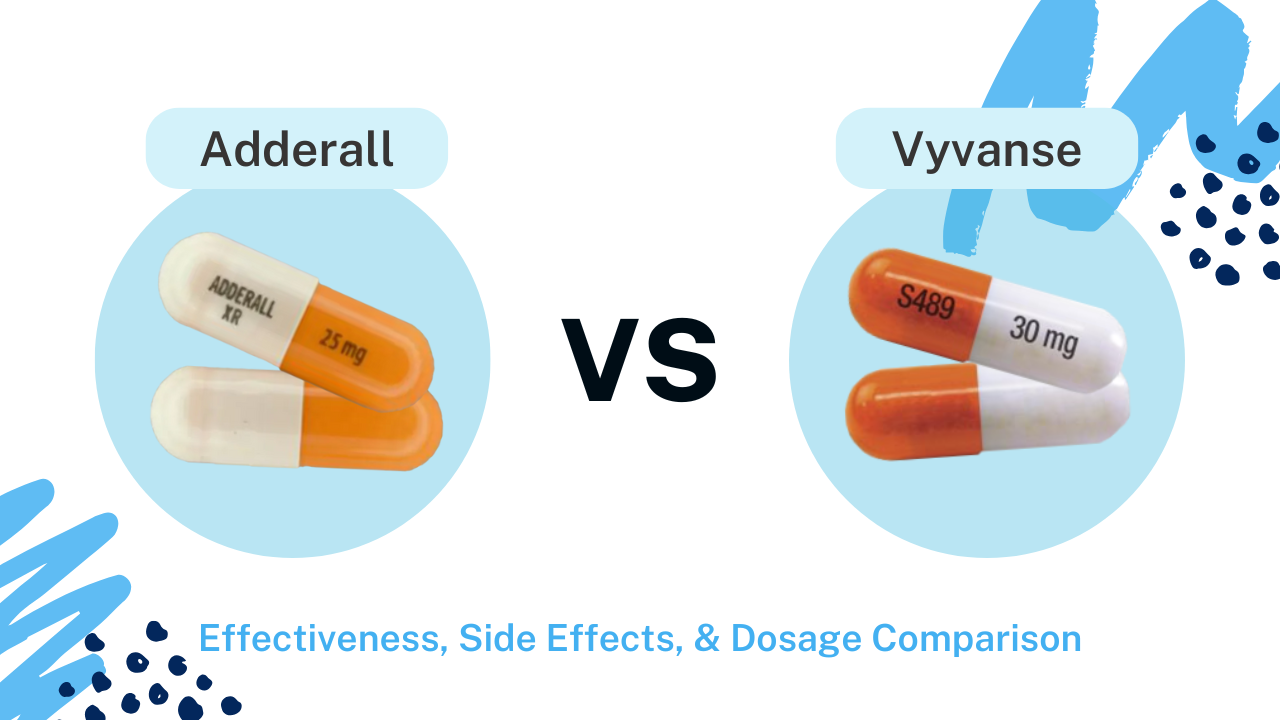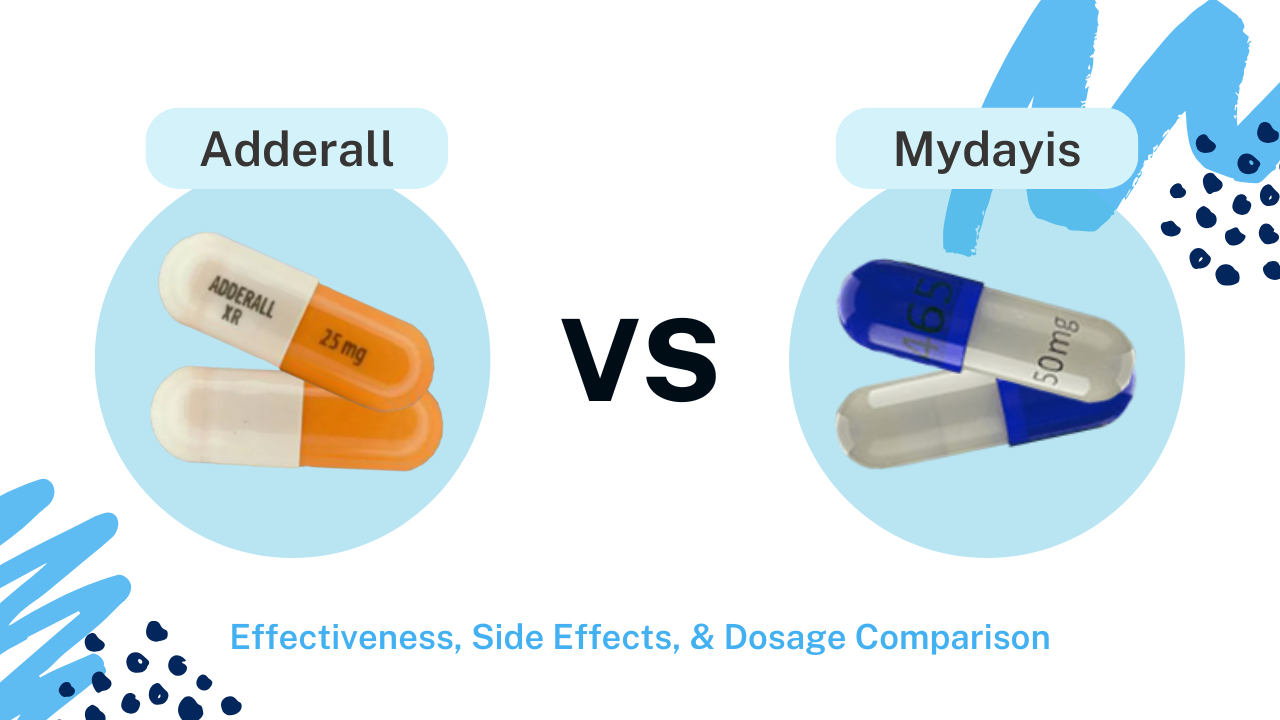Same Day Online ADHD Diagnosis
ADHD assessment?
Also known as attention deficit hyperactivity disorder, ADHD is thought to affect more than 100 million people worldwide, the vast majority of whom go much of their lives without receiving a proper diagnosis. In order to close this gap between those living with ADHD and those receiving proper treatment, we firmly believe that education and understanding are key.
To do our part, we've put together a comprehensive guide outlining one of the most important aspects of ADHD: the three ADHD types, or presentations, and how to identify which applies to you. Below, you'll find the insights and guidance you need to identify common symptoms and decide whether a formal diagnosis with ADHDAdvisor.org might be right for you.
Understanding the Basics of ADHD
While both scientific and public understanding of ADHD has evolved over the decades, the core of the condition remains relatively straightforward; attention deficit hyperactivity disorder is a neurodevelopmental disorder that affects a person's ability to focus, manage impulses and behavior, or control physical motions (tics).
As the full name may indicate, ADHD symptoms and presentations revolve around inattentive, hyperactive, or impulsive behaviors, with many individuals exhibiting a mix of the three main categories. Although the medical and research community has not yet reached a firm consensus as to the root cause of ADHD, research indicates that differences in the brain's structure, environmental factors, and even traumatic injuries may play a role in the disorder.
Typically, cases of ADHD are first diagnosed in children between the ages of 6 and 12 years old by comparing a child's behavior to a standard list of signs and symptoms maintained by the American Psychiatric Association in the DSM-5, a diagnostic and statistical manual that outlines diagnostic criteria regarding a range of mental disorders.
Even so, the vast majority of adults with ADHD go undiagnosed for years, with some studies putting the number of undiagnosed or misdiagnosed at upwards of 80%. When this happens, the negative effects of ADHD can worsen over time or even prompt the development of related disorders, such as anxiety or depression.
Because of this risk, it's crucial for those who suspect they may have ADHD to invest the time needed to understand the condition, its signs, and when to seek a formal ADHD diagnosis or treatment.
The Three ADHD Types and Their Symptoms
First and foremost, it's important to recognize that ADHD and its symptoms tend to vary significantly from person to person and that even two people who share a "type" of the disorder may experience drastically different challenges.
That said, each of the three primary types of ADHD comes with a set of common symptoms that are used by mental health professionals and others to diagnose ADHD more accurately.
Predominantly Inattentive Type
Traditionally characterized by absent-mindedness, aloofness, or distractibility, inattentive ADHD has historically been less diagnosed than the more "obvious" hyperactive-impulsive counterpart. This is due to the tendency for inattentive symptoms to be more subtle, the unfortunate historical lack of accurate diagnoses for girls and women (who present more frequently with inattentive type ADHD), and other factors.
Despite the relative difficulty of recognizing inattentive symptoms, many studies indicate that they are the most common type of symptoms displayed in adults. Some other common symptoms include:
- Difficulties focusing on or completing a task
- Making careless mistakes due to a lack of attention to detail
- Problems paying attention during lectures, reading, conversations
- Avoiding tasks that require sustained mental effort
- Easily becoming distracted by external stimuli
- General forgetfulness or frequently losing items
- Lack of organization and challenges managing time, projects, and other obligations
Predominantly Hyperactive-Impulsive Type
Although hyperactive-impulsive symptoms of ADHD, such as fidgeting, are extremely common among young children, most children will eventually see these symptoms evolve into more subtle versions as they grow into adulthood. As adults, hyperactive-impulsive behavior may be harder to identify as ADHD-related, with many assuming symptoms to be simple personality traits.
It's important to note that even though less than 10% of adults present with only hyperactive-impulsive ADHD symptoms, they appear relatively frequently alongside inattentive symptoms in what's known as the "combined type." Common hyperactive-impulsive symptoms of ADHD include things such as:
- Extreme or harmful risk-taking
- Binge eating or spending
- Frequently interrupting others during conversation
- Inability to "turn off" or stop working
- Tendency to become easily irritated or upset
- Difficulty regulating your temper or outbursts
Combined Type
At approximately 62%, the combined type of ADHD is, by far, the most commonly represented in adults. While this presentation of the disorder essentially means that a person displays both inattentive and hyperactive-impulsive symptoms, diagnosis and treatment can sometimes prove more challenging due to the compounding effects of different symptoms.
Also, the exact symptoms or balance of symptoms may vary widely from one adult to another; while one may experience almost entirely hyperactive symptoms with very few inattentive behaviors, another may experience a more even split between the two. Because of this variability, professional guidance, such as behavior therapy sessions, is often necessary to help individuals get a firm handle on their unique set of symptoms.
ADHD’s Impact on Daily Life
Left unchecked, ADHD's core symptoms can make daily life significantly more difficult, including problems at work, in personal relationships, or even with basic chores and necessary tasks. Some of the most common challenges faced by adults with ADHD include:
Relationship Issues
Whether with friends, family, or romantic partners, ADHD can often interfere with a person's ability to form or maintain healthy relationships. Sometimes, this interference comes from frequent inattentiveness, which may cause loved ones to feel unheard or unimportant. Other times, ADHD's effects on emotional regulation may magnify the impact of otherwise small arguments. ADHD may also cause you to interrupt others when speaking or you might forget about obligations you have committed to, which can cause frustration for your friends, family, or romantic partners.
These effects are so severe, in fact, that some studies indicate that the divorce rate for marriages where one or both partners have ADHD may be twice that found in "neurotypical" couples.
Career and Academic Issues
While distinct from one another in many ways, a person's professional life and academic life may be similarly impacted by ADHD, especially with undiagnosed ADHD. Whether studying, taking tests, performing a task, or working on a large project, inattentive, hyperactive, and impulsive behaviors can all impair a person's productivity, either through heightened vulnerability to distraction or an inability to become and stay motivated.
Beyond simply reducing productivity, unmanaged ADHD can have disastrous effects on your ability to find or keep employment and succeed in school. One example is income: on average, adults with ADHD earn approximately 17% less than neurotypical individuals. Arguably even more alarming is the fact that among all adults with ADHD who attend college, studies suggest that only 5% go on to graduate.
Often, these challenges can be overcome with the right mixture of understanding, planning, and structure, with many adults finding success by organizing their workspace or routine in a way that lessens the negative effects of their ADHD.
Financial Issues
In general, ADHD-related financial issues stem from two main sources: impulsive behavior or difficulties with organization. For many, the former manifests in the form of impulse purchases or other unnecessary expenses that can quickly strain a budget. For the latter, ADHD may make it significantly harder to build a budget in the first place, meet payment deadlines, or keep track of bills.
Regardless of what is true for you, these situations can have serious real-life consequences. Adults with ADHD, for instance, are roughly four times as likely to overdraft their bank accounts or have overdue alimony and school loans and more than six times as likely to default on loans by age 40.
How to Diagnose and Treat ADHD
Although individuals may be able to identify various symptoms and their types independently, meeting with a licensed mental health professional is necessary to obtain a formal ADHD diagnosis. Once this process has been completed, you can begin designing a treatment plan and routine that fits your specific needs and ADHD type.
Diagnostic Process
Before you can begin getting your online ADHD treatment, you must first undergo a formal diagnosis with a licensed clinician. Historically, this was done in person following a referral from your general practitioner. In recent years, however, a growing number of online services have begun to offer more convenient, accessible options to obtain a diagnosis from the comfort of your own home.
Regardless of which you choose, the process is fairly standard and straightforward. As you go into your ADHD diagnosis, you can expect:
- Questionnaires and interviews to identify your potential ADHD symptoms, their severity, and at what age they began
- Clinical tests to evaluate your attention span, impulse control, memory, problem-solving skills, and other cognitive abilities
- Information gathered from friends, spouses, or other people who may observe your ADHD-related behaviors
- A comprehensive medical examination to rule out any underlying conditions or factors that may be causing symptoms
- Evaluating the extent of ADHD-related challenges, such as difficulties at school, work, home, or in personal relationships.
- Checking for mental health comorbidities that often accompany ADHD, such as anxiety, depression, or issues with substance abuse
Treatment Options
Typically, most online ADHD diagnosis services will focus on one type of ADHD treatment—medication management, therapy, or coaching. As our understanding of ADHD expands, however, it becomes increasingly clear that a more holistic, combined approach often provides the greatest results for the greatest number of adults.
After your diagnosis, your therapist will walk you through your treatment options, help with an online ADHD test and explain their respective benefits and how they might be combined. Below, we've included a brief explanation of the three primary types of ADHD treatment.
Medication
In years past, ADHD medications drew a considerable amount of criticism and skepticism due to the tendency of doctors and organizations to over-prescribe stimulants and other drugs. More recently, so-called "pill mills" have come under fire for similar practices.
That said, these same medications, prescribed and used appropriately, can prove enormously helpful in efforts to manage ADHD symptoms and behaviors. In order to confirm whether you're the right fit for medications (both stimulants and non-stimulants), it's crucial to meet with a licensed, qualified licensed medical professional. That way, the two of you can work through the details of your situation, any potential interactions with other medications or health conditions, and whether other types of treatment may be more productive.
Therapy
Traditional therapy and behavioral therapy alike have been used for decades to help manage and treat symptoms associated with ADHD. In order to reap the greatest benefits from this practice, however, it's vital to find a therapist whom you trust and who offers the expertise and approach to therapy that fits best with your needs.
Once this has been accomplished, the two of you will work together to identify symptoms and how they impact your life, construct healthy habits, and reinforce positive behaviors. Additionally, your therapist can help unpack any anxiety or low self-esteem related to your adult ADHD and work to re-establish self-confidence.
Expert Tip-Including your partner, spouse, or other family member in a therapy session(s) may be beneficial in increasing their understanding of the diagnosis and how they can most effectively support you through your treatment process.
ADHD Coaching
At first glance, coaching and therapy may seem indistinguishable from one another. And while the two do share important similarities, they're ultimately intended to provide very distinct benefits and advantages.
While therapy generally aims to improve a person's understanding of and relationship to their ADHD, success coaching is much more task-oriented in nature. Rather than looking to rebuild self-confidence or tackle generalized anxiety, success coaching identifies key difficulties a person experiences in their day-to-day life and then works to develop systems or behaviors to help them overcome those difficulties.
Why Trust ADHDAdvisor.org?
Access to mental health services has greatly expanded in the 21st century, with one of the most significant advances being the advent of online diagnosis and treatment. Although many such platforms offer only medication management, others, such as ADHDAdvisor.org, provide a more comprehensive, holistic approach.
At ADHDAdvisor.org, we partner with only the most experienced, dedicated mental health professionals to bring you expert diagnosis and treatment from the comfort of your own home. Part of making this work, however, is ensuring that each patient is matched with exactly the right therapist for their situation and personality. To do so, we maintain a passionate team of matching specialists who will work with you to find the perfect fit.
As an online service offering help with medication, therapy sessions, and success coaching, we're uniquely situated to offer benefits such as:
- A free intake assessment designed to help you identify potential signs and symptoms of ADHD
- Your initial consultation, diagnosis, and customized treatment plan within days of beginning our process
- In-home one-on-one behavioral therapy sessions to develop support structures and coping techniques
- Goal-oriented success coaching to address specific needs and challenges in your daily life
- Flexible scheduling for appointments
- Access to expert care regardless of your geographical location
- Subscription options to help build consistency and save on expenses
- Money-back guarantee for all diagnostic sessions
Final Thoughts
Despite the fact that ADHD is one of the most common neurodevelopmental conditions in the world, the public's understanding of it still falls far short of where it could be. And, although the conversation surrounding mental health becomes more accepting and inclusive with each passing year, more than 80% of adults living with ADHD go years—or decades—without a proper diagnosis.
If you believe that you or someone you love may be living with ADHD, consider reaching out to a dedicated, trustworthy service like ADHDAdvisor.org to take a free intake assessment or schedule a diagnostic session with a licensed professional.
No matter what type of the disorder you may have, the path to treating ADHD starts with finding help and guidance you can trust. At ADHDAdvisor.org, we work hard to deserve that trust, and we'll prove it every step of the way—from the first question of our free quiz to each session with your dedicated therapist.























